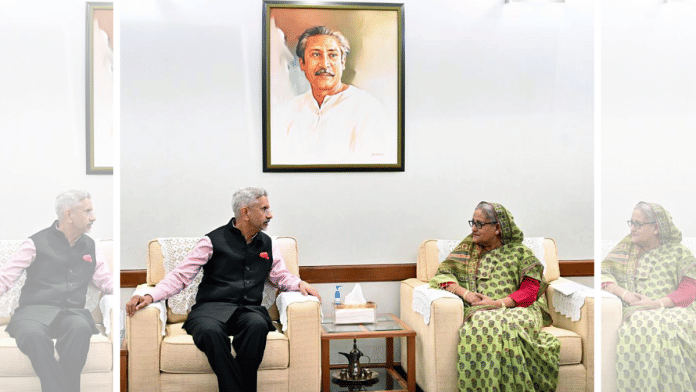Dhaka, Bangladesh: Without naming the dragon in the room, External Affairs Minister S. Jaishankar spoke against nations violating “long-standing agreements” and “opaque” lending practices in the Indo-Pacific, while delivering an address at a conference in Dhaka, Bangladesh, Friday.
Speaking at the 6th Indian Ocean Conference inaugurated by Bangladesh Prime Minister Sheikh Hasina, the foreign minister said a stable international order relies on three principles — adhering to the law, observing norms and respecting rules.
“When nations disregard their legal obligations or violate long-standing agreements, as we have seen, the damage to trust and confidence is immense,” said the Indian foreign minister.
His remarks come as India and China continue to be engaged in a border standoff along the Line of Actual Control in Ladakh.
The two-day conference starting Friday has been jointly organised by the Bangladesh foreign ministry and a Delhi-based research centre, India Foundation. It has seen the participation of representatives from 25 countries, mostly part of the Indian Ocean region.
Government officials, academics, former ambassadors and political analysts from countries including Bangladesh, India, Sri Lanka, Somalia, Maldives, Oman, Australia and others, discussed the changing world order, maritime security, and climate change, among other issues, at the conference.
Meanwhile, no participants or speakers from China took part in this year’s conference unlike in the past, where Chinese officials such as Wei Hongtian, then ambassador of the Department of Boundary and Ocean Affairs in China’s foreign ministry, made appearances.
Also Read: Counting on India, China & Japan in changing world order, says Egyptian official
‘Unsustainable debt generated by unviable projects’
In an indirect reference to China’s so-called “debt trapping” strategy, Jaishankar, in his address, urged countries in the Indo-Pacific not to repeat mistakes made in the past when it came to “unsustainable debt”.
“If we encourage opaque lending practices, exorbitant ventures and price points that are unrelated to the market, these are bound to bite us back, sooner rather than later,” said the external affairs minister.
He added that at times, “sovereign guarantees” have been placed on the negotiating table without due diligence.
“Many of us in the region are today confronting the consequences of our past choices. This is time to reflect and reform, not one to repeat and reiterate,” he said.
According to a study by US-based research lab AidData, the World Bank, Harvard Kennedy School, and the Kiel Institute for the World Economy (an institute), China has emerged as the biggest lender to developing countries that have been unable to pay their debts under the Belt and Road Initiative (BRI).
The country has reportedly doled out a whopping $240 billion from 2010 to 2022, said the study.
(Edited by Richa Mishra)






